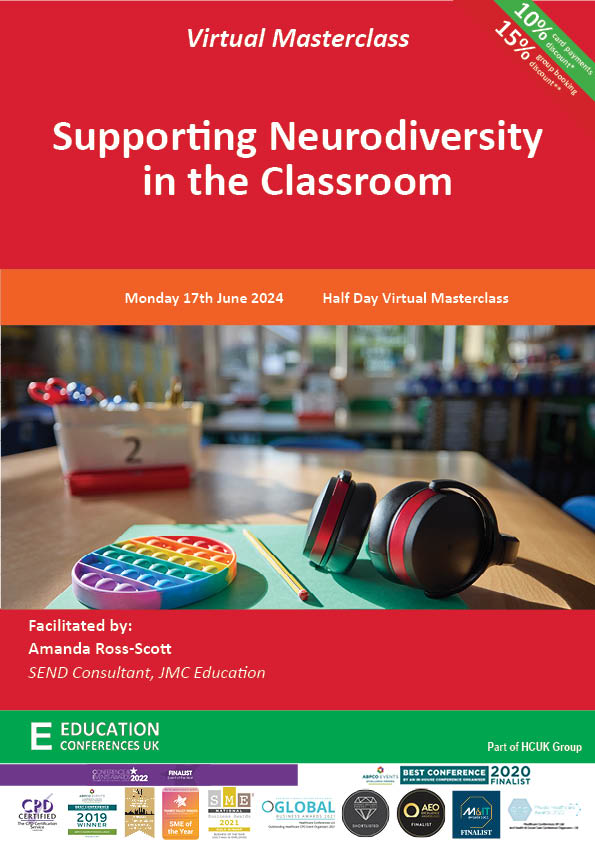The paradigm-shift from differentiating for individual Special Educational Needs in the classroom to adaptive and neuroinclusive teaching can be challenging for overloaded teachers. This half day Masterclass unpacks these concepts and provides the practical tools needed to adopt this new approach with confidence.
It is estimated that students with learning differences such as dyslexia, dyspraxia, autism, and ADHD now make up 15% – 20% of UK school populations. Without appropriate support, these students may underperform academically as a direct result of their challenges. This reduced achievement can lead to an erosion of self-esteem, deteriorating mental health and challenging behaviour.
While these neurodevelopmental differences are distinct and may still need to be supported at an individual level, subgroups have traits in common. Differentiation for individuals has been the primary approach to support in the classroom, but a paradigm-shift towards adaptive teaching means teachers need to adopt a range of approaches in the classroom that support progress for all students. Mainstream, evidencebased teaching strategies have the potential to improve outcomes for both neurodivergent students & neurotypical students alike.
This half-day Masterclass explains the key traits shared by the most prevalent neurodivergent groups, how they impact on learning, and matches these traits with solutions from mainstream teaching pedagogies.
WHO SHOULD ATTEND
Relevant to all classroom teachers and learning support assistants. This course would also be useful to school leaders looking to increase neuro-inclusivity as part of long-term School Development Plans.
KEY LEARNING OBJECTIVES
This Masterclass/session will enable you to:
Attendees will deepen their understanding of the specific challenges faced by neurodivergent students in the classroom and reflect on a range of helpful pedagogical approaches to explore.
Understanding how the concept of neurodiversity is driving a change in classroom teaching from differentiation to adaptive teaching.
Overview of how this change fits with Duties under the Equality Act 2010, and with ISI & OFSTED 2023 inspection criteria in relation to pupils with SEND.
Understanding that barriers to learning are disabling factors under the Equality Act 2010.
Knowing that some students’ individual needs must still be identified & supported.
Knowledge of the key challenges shared by many students with learning differences.
Developing a toolkit based of key pedagogical approaches that benefit the full range of neurodiversity.
Understanding a range of additional classroom factors that contribute to student wellbeing and improve academic outcomes.
FACILITATOR
Amanda is a freelance SEND consultant, executive function coach, conference speaker and trainer specialising in all aspects of SEND, neurodiversity and whole school approaches that support students with neurodivergent traits.
With over 15 years’ experience leading on SEND & Inclusion in schools, as Assistant Head Teacher, Head of Learning Support, DDSL and Wellbeing Lead, Amanda understands the demands of integrating SEND support within the wider, complex context of whole-school management.
Now working as a consultant, Amanda supports parents and schools who often seek guidance when they have reached crisis point due to lack of engagement from overstretched local authority services. She is passionate about delivering neurodiversity awareness training as she believes that effective whole school approaches and adaptive teaching strategies support teachers, help to avoid crisis and promote positive outcomes for all pupils.
In her private practice as an executive function coach, Amanda works individually with young people and adults with Autism, ADHD, Dyslexia, and mental health challenges to recover their self-esteem and confidence and acquire new skills to achieve the outcomes they seek in education or on their journey through life.





